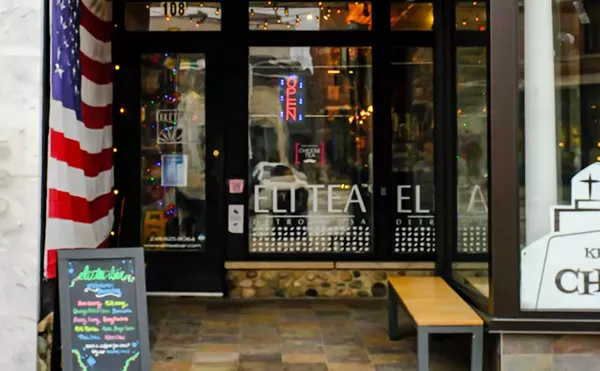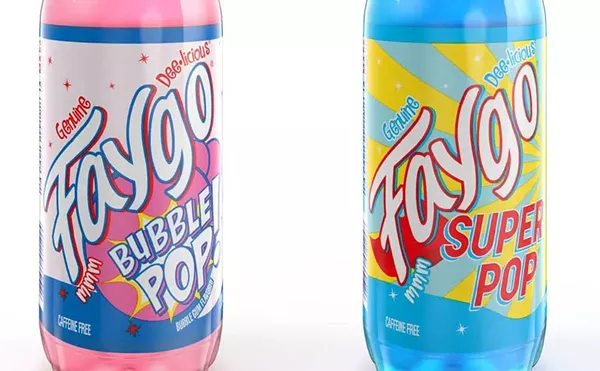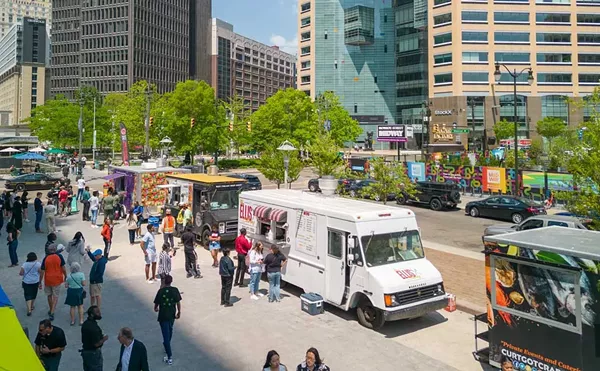"I think cooking is like a ... heart. After I cook, I always feel, you know, this food is coming good ... 100 percent."
For more than five years, Pandian (along with co-owner Suruli Narayanasamy), has been serving Indian vegetarian cuisine at Udipi, inside a strip mall on Orchard Lake Road in Farmington Hills. But unlike most typical Indian restaurants in metro Detroit that offer Northern Indian cuisine (aside from Royal Indian Cuisine in Wyandotte and Priya in Troy and Farmington Hills), Udipi's cooking savors Southern India's flavors, featuring a full range of curries, rice specialties, Indian breads, uthappams (South Indian pancakes), dosais and traditional Indian deserts and drinks.
"The South is different ... spices are the same, but cooking ways different."
Pandian explains that both the North and South use the same spices, only in different proportions; for instance, Northern Indian cooking is heavier on the cumin. And the North uses wheat flour much more extensively, to make breads and chappathi crepes.
"We use a lot of rice and rice flour. Because we eat with the breakfast, usually, masala dosai."
Udipi, the name of a coastal town of Karnataka state, is famous for its Krishna temple and masala dosai. But also, in India, the word "udipi" over a restaurant gives the green light to vegetarians.
"Udipi means this is a vegetarian restaurant," Pandian says.
And just like the city Udipi, Pandian's place specializes in the crepelike dosai — however Pandian no longer makes them herself, like she did in the restaurant's beginnings. Now she leaves the kitchen cooking duties to Murali Jayaraman's expertise.
With an extra-wide spatula, Murali spreads out a pancake mixture of rice flour and ground lentils, then spirals it out onto the wide grill until it's so sheer you can't imagine it could ever be lifted without falling into pieces. When golden brown from the sizzling corn oil underneath, the crepe is curled into a crispy plain dosai. Covering the entire plate, the dosai looks like an inverted ice cream cone for the Jolly Green Giant, and is a kid's favorite when slathered in coconut chutney.
All dosais are served with a mild coconut chutney hinting at cilantro and ginger, a carrot chutney with a red-chili kick and sambar. Uncommon in the North, but a staple dosai dip in the South, sambar is thin and warming. It's a dosai-dunking soup made with tomatoes and lentils and a piquant onion flavor.
Pandian chose to have a meatless menu because many Indian families are vegetarian:
"Why? That's their religion, the Hindu religion."
That means no fish, no chicken, no beef and no egg, but they do eat ghee — clarified butter. Udipi has a mostly Indian clientele, centering around the substantial Indian population in Farmington and Detroit.
"America people, they eat nonvegetarian a lot. Some vegetarians, they come — only vegetarians."
Nonvegetarians balk at no sign of meat on the menu, but if nobody told them, they'd probably leave Udipi just as satisfied as eating carnivore victuals, having also enjoyed a little food for the eye.
When it comes to Udipi's dosais, geometry meets the ancient wonders of taste in a visual array that's reminiscent of extraterrestrial crop circles, but these wonders are unbelievably edible.
For the paperlike masala dosai, Murali spreads the mix thin, this time in an oblong spiral like a ring-laced galaxy. When it reaches a golden brown, the dosai is garnished with green cilantro, mustard seed and lentils, then filled with potato masala: a creamy yellow mild mingling of split garbanzos, onion, curry leaves, lime juice, ginger and potatoes. Tumeric gives the dish (and many other Indian specialties) its yellow hue. After it's filled, the dosai is rolled into a long cylinder. It's a creation even a dinner plate can't hold, overlapping the edges like a baseball bat.
If you want more of a taste-punch, but still want the fun for the eye, try the mysore masala dosai. This circular crepe is covered in a layer of carrot chutney (flavored with spicy red chili and tropical tamarind) before the middle is filled with potato masala. Then the edges are folded to the center, forming a too-big-for-the-platter triangle with a potato-stuffed body and corners with a kick.
To compliment any meal, Udipi regularly serves rasam soup, a sour, tart and satisfying salty broth, like an Indian version of the Thai tom yum, infused with pureed tomato, black pepper, tamarind and cumin — which, according to Murali, acquired its name from the Tamil word cirakam, because it aids in cleansing internal organs. With its hint of garlic, the warming rasam could cure your ills just as easily as a bowl of mom's chicken soup.
If you've left any room for desert, finish off the meal with a Madras coffee and gulab jamun (dough balls made from dry milk and cheese, fried in corn syrup until they have the taste and consistency of jellied donut holes with a touch of cardamom).
And don't think the taste sensations of Southern India are only possible outside the parameters of your kitchen; just visit Udipi and its exotic, seasoning secrets will be within your salt-and-pepper grasp (minus a few bucks from your wallet, of course). Pandian has compiled a cookbook of her recipes — written with the help of her sister, Vanajothi Raj — including meat dishes (with most of the book's proceeds going to the Parashakthi temple she and her sister attend). Inside Mysteries of South Indian Cooking, recipes are simply presented, along with the secret to Indian cooking's amazing textures and vivid flavors. (Pssst! It's hard work, like grinding the spices just before use.) And according to Pandian, you shouldn't worry about not finding what you need.
"Here nowadays all the ingredients we have. Everything you can get here; there are a lot of Indian stores. No problem."
But if you want to follow Pandian's complete food-osophy, you need more than recipes to make the dishes work.
"When you cook something, your mind is also thinking — you want the food is very good. This food comes very good."
Pandian's English may be broken, but you only have to take one look around at the people enjoying Udipi's culinary fare to see that her food speaks to them with gratifying flavor, and 100 percent heart.
Chef Thilagam Pandian's recipes for Plain and Masala dosai
Udipi is at 29210 Orchard Lake Road, Farmington Hills; call 248-626-6021.
Read other chefs' stories in Chow!! (this week's special restaurant collection):
• Tribute's Takashi Yagihashi refines the yin and yang of multicultural cuisine.
• Mind-morphing means sweet surrender to Agave's chef Carlos Bonilla.
• Laurent Devin keeps the Gallic fires burning at Elaine Bistro Français.
• Loving Spoonful ladles out the full flavor of Shawn Loving's approach.
Anita Schmaltz writes about film and other pleasures for Metro Times. E-mail her at






